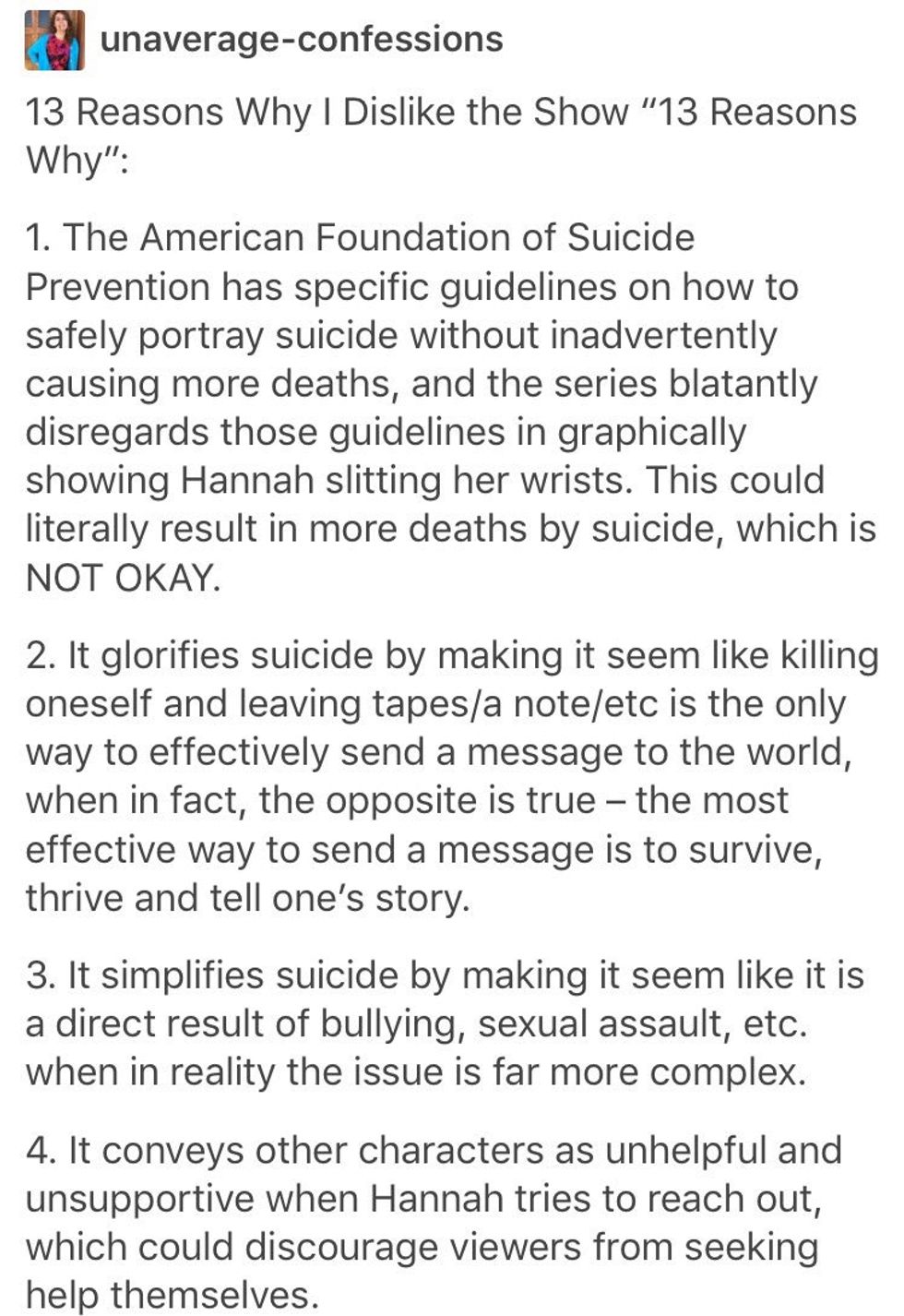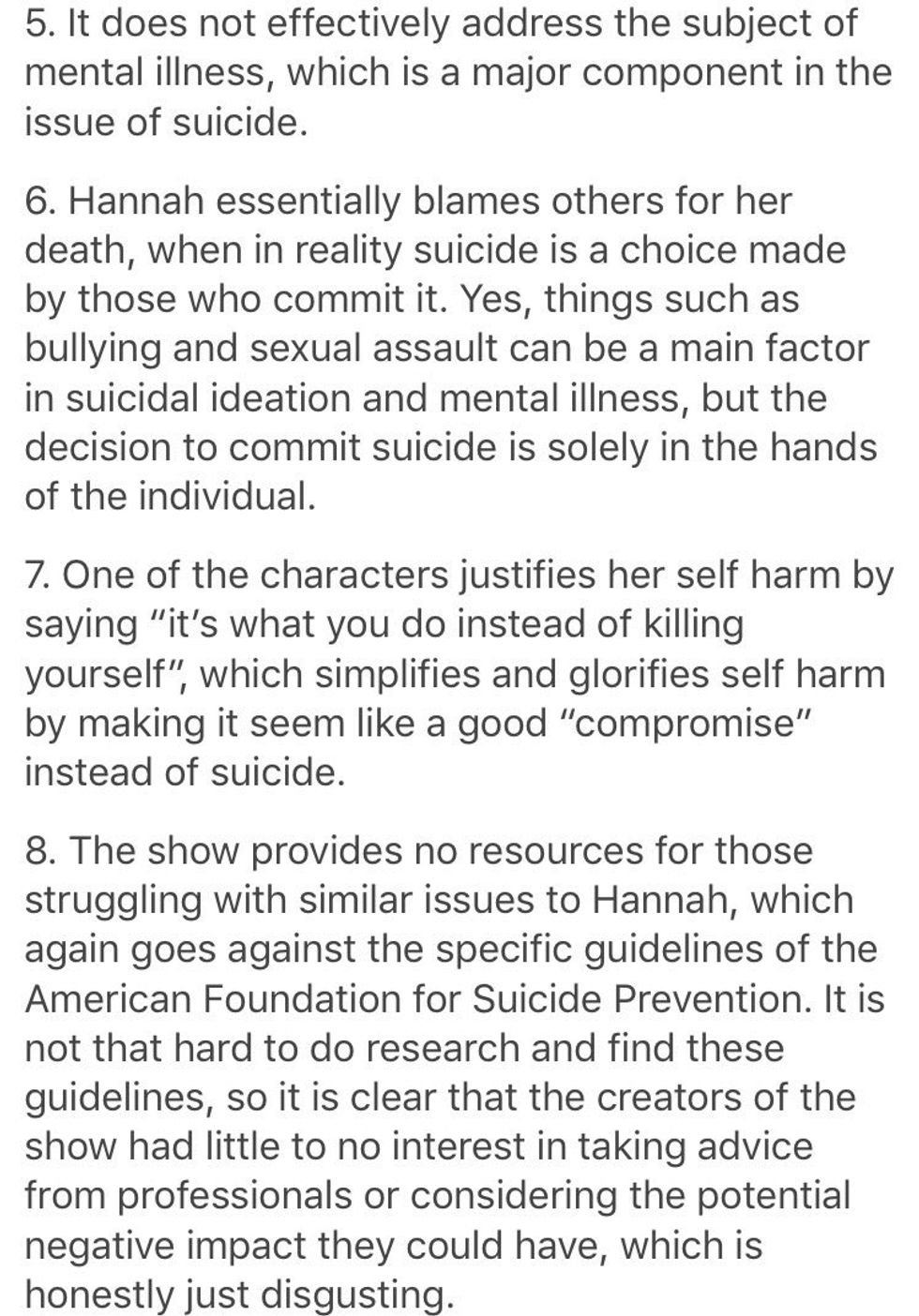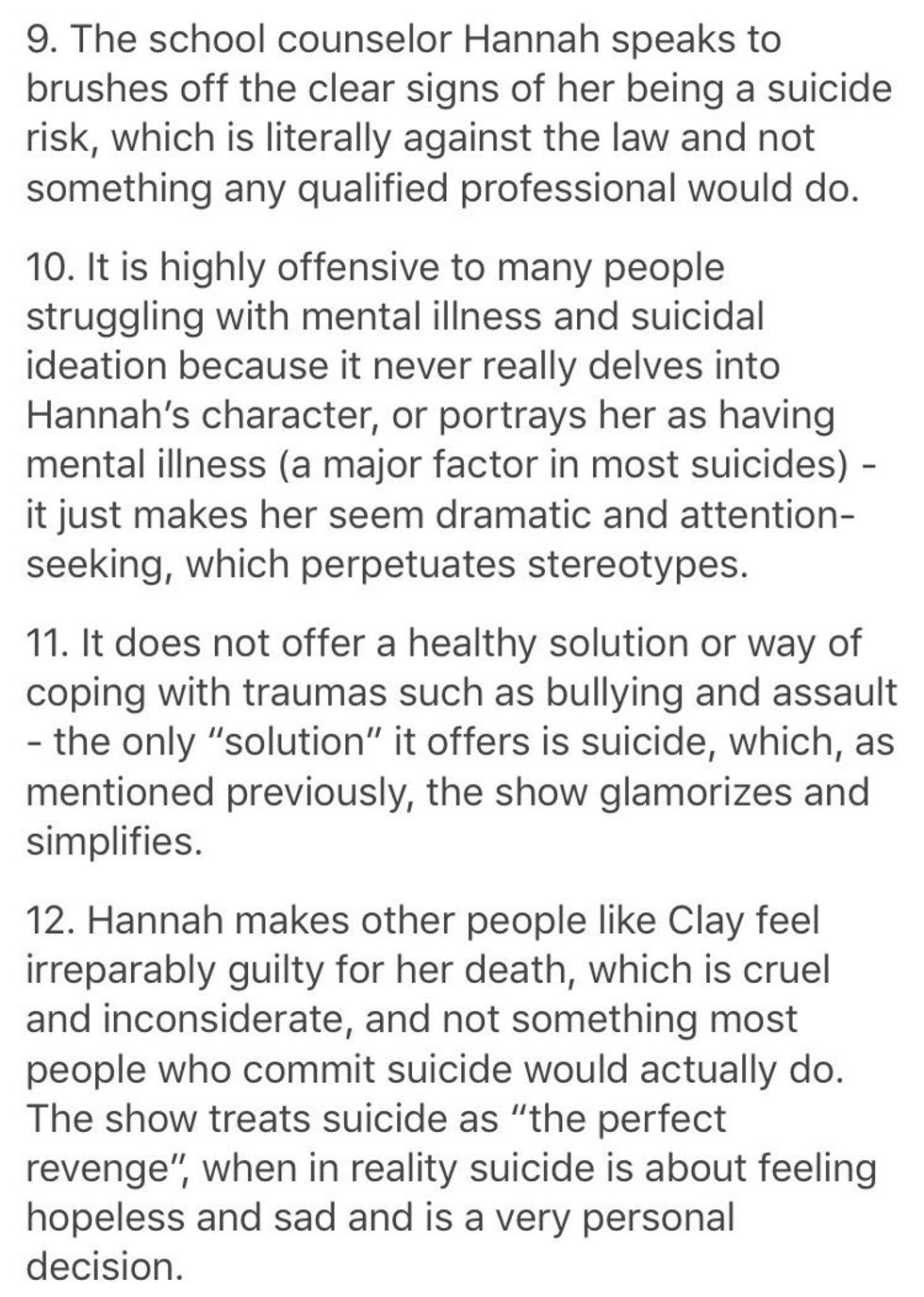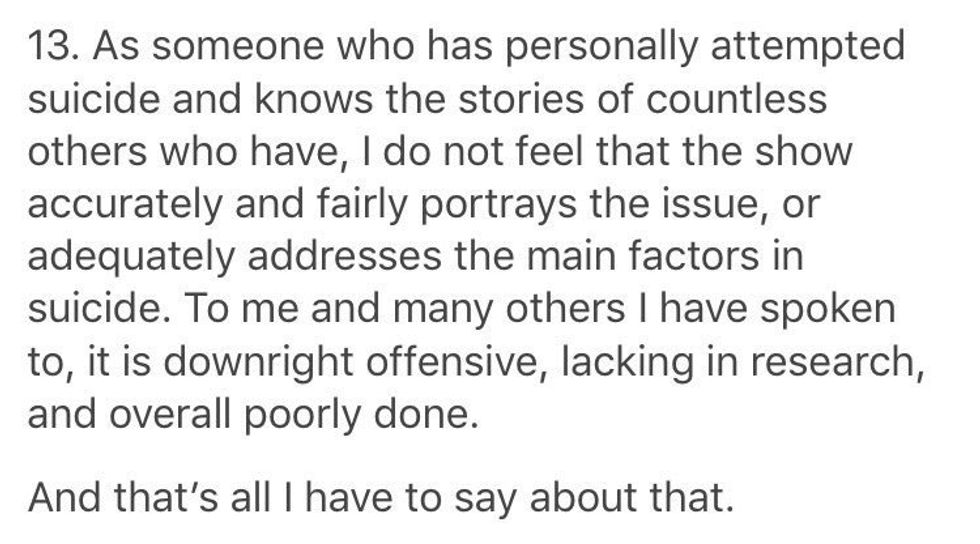TRIGGER WARNING: The following article deals with suicide, self-harm, and mental illness.
Now that it’s been well over two months since the infamous 13 Reasons Why has been released on Netflix, it’s safe to safe that the hype over the hit series has relatively subsided. A closely speculated and extremely controversial show, it has taken the world by storm and moved people everywhere to take suicide awareness more seriously. It has also faced mixed backlash and raised concerns for being highly offensive, inaccurately portraying mental illnesses, and triggering youths across the nation. Here are 13 reasons why it did so, as deserved:
It certainly had a distinct shock value, but the images and depictions hadn’t started to affect me until a good few weeks after. In the moment, it did feel strange. I was watching someone end their life. Hearing what went through someone else’s thoughts as they planned to and watching them act on them. But it was nothing I didn’t think I could make it through. I made it through alright, but constantly thinking about Hannah was hell for me. A fictional character, and still I wanted to do something so badly… still, I wondered how their story would wind up, if maybe, just maybe… that were me.
For weeks I was haunted by the image of Hannah Baker lying there with her wrists bleeding out in her bathroom and the life leaving her body.
Sadly this is how a lot of suicides pan out. Sadly, this is reality.
For many, the most shocking part of the show was the sequence of events leading up to the decision in her taking her own life and how much the things we do and say affect the people around us.
But for me, those things didn’t surprise me. I felt that I knew how much of an impact our words and actions can have on others. For me, the most shocking thing of all was how instantaneous the death was. No, it’s not necessarily a quick one. No, it’s not a painless one. But once that life is over, it’s over. Part of me became enamored by the idea of that. The idea that in one short instant, you could end it all. In that one short instant, you could make it all go away. Something about that fascinated me, and I knew it couldn’t have been just me. There had to be others that felt the same way that I did.
According to the National Association of School Psychologists (NASP), “research shows that exposure to another person's suicide, or to graphic or sensationalized accounts of death, can be one of the many risk factors that youth struggling with mental health conditions cite as a reason they contemplate or attempt suicide.”
In this sense, this is not a healthy show. The show did address how we can all be kinder and teach one another compassion, which can ultimately prevent an untimely death, but it could have done more to be less undignified and not blatantly disrespect suicide survivors and others. I’m not asking for suicide to be portrayed in a different level of violence or vividness (because I don’t feel like it should be at all), nor am I saying that I do not at least somewhat understand why the producers deliberately chose to shoot this scene at all. I am having some trouble understanding it still and I do not agree with their choice wholeheartedly. However, what I am questioning the most is why they hadn’t been more considerate of their cinematographic choices and how they filmed it; I am wondering what its purpose beyond attempting to show how painful death can be – which I’m sure we all know – was, and how they could even for a second believe that it wouldn’t inspire others like myself.
Sometime between March and April, I had gone into a deep depression. But my depressive episodes would come and go, so I thought I would be able to take on a show as explicit as 13 Reasons Why. I wasn’t. After watching 13RW, I frequently thought of Hannah Baker. Not right away. At first, I told my friends I was fine. I did cry watching it, but I felt numb. I didn’t feel as pitiful or surprised as I thought I would have. Until subsequently after. Some time passed. And this show affected me far more than I ever dreamed it would.
I didn’t fully realize the impact it would have on me until it was too late.
As someone who used to self-harm in their youth, I can only imagine how much more this would have triggered me if I had not gotten past that part of my life. And there are people that do engage in self-injury, even at my age, even older. Alexa Curtis, who wrote “Does ’13 Reasons Why’ Glamorize Teen Suicide?” for Rolling Stone told CNN, “had I been watching that as the vulnerable, fragile kid that I was when I was 13 or 14, I might have watched that and thought, 'Oh, that's the easy way out. This is going to get me the attention that I need. This is what I have to do.’” There is a disclaimer at the beginning of the episodes containing these scenes that warn viewers that the content may not be appropriate for “younger audiences,” but even this does not suffice or apply to everyone, either.
As an 18-year-old living in America, I am not considered a "younger audience" and I still felt violated and traumatized by this scene. It showed me what could happen to me or to my family if I ever decided to take my life. If that was the point, right on. But how does that make me better?
Is that somehow supposed to scare me into not making that decision? Was that the purpose of showing it? Because I thought we’d learned by now that fear tactics never work or cease to fail time and time again. We shouldn’t allow that to instill terror in our hearts about why we shouldn’t do it, but why we should all just be kind and decent human beings from the get-go to ensure that no person ever feels the need to resort to something so devastating.
We know by now that that was the overarching lesson of the show. But the way the most debated scene in the entire series had been filmed could have been done far more differently, no doubt. Yet there was a larger overall theme that the creators could have chosen to showcase by means of excluding that scene entirely and instead of exhibiting the importance of handling the subject delicately, but they didn’t.
By making this cinematic choice, they did do some justice to suicide awareness, but more or less completely missed the point of raising awareness about the significance of creating content that does not trigger individuals or make them feel worse than they may already. The whole point is to make sure that fewer people look for it as an alternative, not to make sure that more people are exposed and desensitized and therefore encouraged by it.
We can talk about suicide without actually showing suicide because in many cases, where you think to show it will help or raise awareness about what it “looks” like or how it feels, chances are, it won’t. It will only make things worse.
We all missed the point of the show because a lot of the people behind the show didn’t even understand the point of the show and didn’t understand the consequences that one simple but important scene virtually had on everyone who watched it – whether it was subconsciously like it initially was for me or not. In all honesty, it can do severe damage to anyone. On top of attributing to attributing to an increase in suicidal conduct and self-injury, it also minimizes so many other stories and erases those of survivors of depression, failed attempts, etc.
I understand that the point was to show “normal” people what it could be like to lose a loved one to suicide. (Not to even begin with how suicide shouldn’t even be about how much they’ll miss you, but about how much you will miss and how many better things life will have to offer in the future.) But knowing that it is a thing that many mothers, fathers, brothers, sisters, aunts, uncles, grandmothers, grandfather, cousins, lovers, and others in the world have had to witness and hoping that no one ever has to watch themselves or their loved one(s) go through that should be enough to go off of to pay respect to the lives that were voluntarily taken and to those that have contemplated or are contemplating it.
It should not be a thing that is graphically displayed for the sake of “viewing” or understanding something. I’m pretty sure we are all aware of how serious suicide is, or at least I’d hope we are, but we’re not, and that’s the problem. And since that’s a problem, we should be welcoming ways to prevent it rather than brainstorming how we can film it and profit off of it. Showing a young girl bleeding to death in her own bathtub isn’t educating anybody; it isn’t entertaining anybody; it isn’t informing anybody. There are healthier, more effectual ways of getting the point across to people, ways that don’t trigger them.
I understand that it’s a story, and that stories imitate life, and that it’s important to hear Hannah’s story because her story is based on reality and what happened to her really does happen to people in real life. But for the sake of mental health, please don’t do it. We can understand what would happen without the gory depiction. People that are suicidal are already on the cusp of fantasizing about their death enough as it is or thinking about what it would be like more than you can fathom. It’s not the greatest to see that come to life on a screen when it’s already riveting the mind.
I understand that the point was to function as a wake-up call for those who have been asleep on the matter and as a rude awakening for the ramifications of what this poor innocent girl went through can be. But I have already been rudely awakened by my own thoughts, and seeing what would actually happen if I actually did it doesn’t help at all. If anything, it makes things worse. Surely there are other ways to combat this issue than for some television show creators to sit in a board room and conjure up some ways to trigger their viewers. Doing this makes people feel as though it’s a valid and efficacious option. All I ask is that we think of ways that we can learn to not make it an option at all.
Let’s work to erase it as an option. Let’s work to make people feel safe and like suicide is never something they should opt for. Let’s open up the conversation about suicide. Let’s work to improve mental health and educate people on that instead. Let’s offer free counseling and care for our teenagers and young adults and anybody who is suffering. Let’s really cater to the needs of everybody who is hurting, and everybody is hurting.
These are all necessary solutions and measures toward enhancing the discourse around suicide as a whole. Once we are mature enough as a society to approach the topic in such a manner, we are that much closer to achieving a more conscientious outlook on it without having to resort to filming suicide scenes in order to better “educate” one another. How we educate one another begins with prevention, not just the consequences of the act itself.
If you or someone you know is in crisis and needs immediate help, call the toll-free, 24-hour hotline of the National Suicide Prevention Lifeline at 1-800-273-8255. You’re not alone.




















